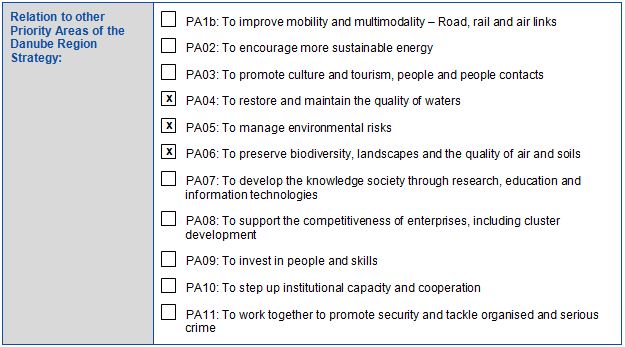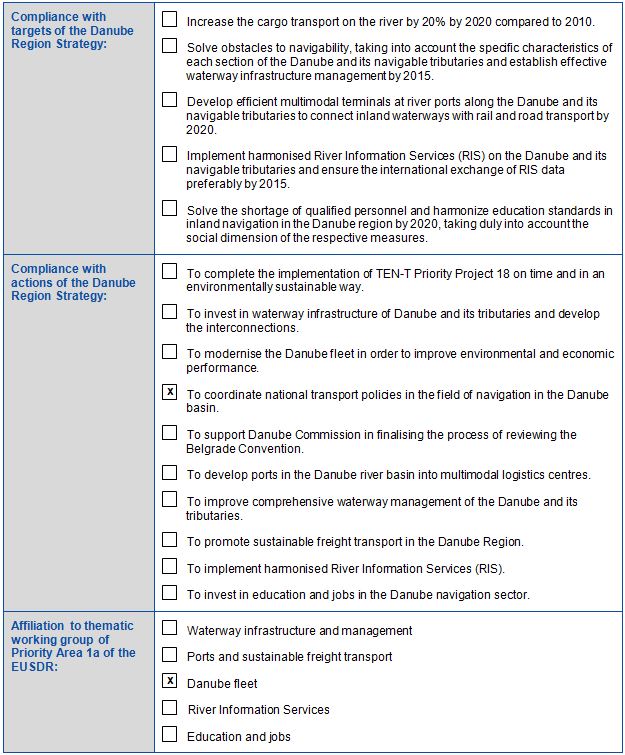BASIC PROJECT DATA
Project ID: PA1A003
NEED AND ADDED VALUE FOR THE DANUBE REGION STRATEGY
The river Danube is a unique ecosystem with a high biodiversity, an important water reservoir and an international waterway with high potential for inland navigation being promoted by the EU’s transport policy (NAIADES).
Due to significant differences and missing coordination in the current practice of ship waste management in Danube countries the increase of inland waterway transport enhances the environmental risks related to illegal ship waste discharge. In order to account for this, the project WANDA aimed at establishing a sustainable, environmentally sound and transnationally coordinated approach in ship waste management.
OBJECTIVE(S) OF THE PROJECT
The core objectives of WANDA were:
- the protection of the river Danube from pollution in order to preserve its valuable ecosystem and water resources and
- the establishment of a cross-border coordinated ship waste management system along the Danube
CONDUCTED PROJECT ACTIVITIES
The following key activities were set up and implemented by the project:
- Preparation of coordinated ship waste management concepts on national level.
- Development of pilot activities for the collection and disposal of hazardous and non-hazardous ship waste.
- Creation of a basis for the elaboration and implementation of an international financing model for oily and greasy ship waste.
- Promotion of cross-border communication and knowledge transfer through harmonisation activities.
TRANSBOUNDARY IMPACT
The WANDA project was based on the idea of trans-national cooperation in the Danube region. Participating countries were Austria, Slovakia, Hungary, Serbia, Croatia, Romania and Bulgaria. Specific transboundary effects were gathered through the implementation of cross-border pilot actions for collection of ship waste and close cooperation for developing ship waste management concepts as well as joint follow-up actions. The concepts elaborated take into account all special features of the participating countries.
PROJECT BENEFICIARIES / TARGET GROUPS
- Authorities dealing with environmental protection, waste management and inland navigation in the Upper, Middle and Lower Danube countries
- Stakeholders of the inland waterway sector, in particular skippers navigating the Danube, ship-owners and fleet operators, port administrations and port operators and waste collection companies
- International organisations active in the field of environmental protection, waste management, inland navigation and ship waste management (Danube Commission, Central Commission for the Navigation of the Rhine, International Commission for the Protection of the Danube River, International Sava River Basin Commission)
- Policy makers, their advisers and teams and high ranked civil servants
STATUS AND TIMEFRAME
Start date: 04/2009
End date: 03/2012
The project is already concluded.
FINANCING
Total budget: 1,667,240 EUR
EU funds: 1,417,154 EUR were funded by South East Europe Transnational Cooperation Programme (SEE) 2007 – 2013
National funds: 250,086 EUR
PROJECT TEAM
Project leader: via donau – Österreichische Wasserstraßen GmbH / Austria
(website: www.viadonau.org)
Address: Donau-City-Straße 1; 1220 Vienna / Austria
Project partner(s):
- VUVH – Water Research Institute Bratislava / Slovakia
- KTI – Institute for Transport Sciences Non Profit Ltd. / Hungary
- RSOE – National Association of Radio Distress-signalling and Infocommunications / Hungary
- APDF – National Company Administration of Danube River Ports J.S.Co Giurgiu / Romania
- APDM – National Company – The Maritime Danube Ports Administration SA Galati / Romania
- EAEMDR – Executive Agency for Exploration and Maintenance of the Danube River – Ruse / Bulgaria
- PAV – Public Institution Port Authority Vukovar / Croatia
- PLOVPUT – Directorate for Inland Waterways / Serbia
PROJECT ENVIRONMENT
PROJECT CROSS – REFERENCE
- WANDA built upon the results of the feasibility study “Ship borne oily water and waste on the Danube” (1999-00, PHARE) and national initiatives.
- Blueprint for organizing the collection of waste from IWT vessels in Romania, elaborated by NEA / Holland
- PLATINA (2007-11, FP7)
- The Ship Waste Collection System in the Maritime Danube Ports – CODENAV project, funded by the Romanian Sectoral Operational Programme for Transport
- Ship Waste Collection System in the ports of Moldova Veche, Orşova, Drobeta Turnu Severin, Giurgiu, Călăraşi, Cernavodă, also funded by the Romanian Sectoral Operational Programme for Transport
- CO-WANDA – Convention for Waste Management for Inland Navigation on the Danube (PA1A017)
STRATEGIC REFERENCE
- Waste prevention and management was one of the four top priorities of EU’s Sixth Environment Action Programme (2002–2012). The preventive approach to waste management was detailed in the 2005 Thematic Strategy on Waste Prevention and Recycling and the Waste Framework Directive (2008) where it has highest priority in the waste hierarchy. Also, member states were required to develop waste prevention programmes not later than December, 12th 2013.
- Sustainability is one of the priorities of EU 2020, the European Union’s growth strategy for the current decade. WANDA contributes to sustainable growth by pressing ahead environmental protection, reduction of emissions and cooperation with inland waterway companies and ports. Through the advancement of the sector’s environmental performance, WANDA enhances the competitive position of inland waterway transport in the Danube Region.
- The European Action Programme for Inland Waterway Transport (NAIADES) aims at promoting inland waterway transport. WANDA contributes to three out of five defined strategic areas, namely fleet, infrastructure and market.
- The Danube Region Strategy supports creation of synergies between existing policies and initiatives in the Danube Region. WANDA is explicitly mentioned as a contribution to the “Improvement of Mobility and Multimodality”; moreover it clearly supports other identified priorities, such as environmental protection or strengthening the region by fostering transnational cooperation.
- Joint Statement on Guiding Principles for the Development of Inland Navigation and the Environmental Protection in the Danube River Basin.
RELEVANT LEGISLATION
The legal and administrative framework with relevance for ship waste management along the River Danube includes a multitude of directives, regulations and laws on national and supra-national level. In general, regulations are part of four main areas of activity, as described below.
- Waste Management (e.g. Waste Framework Directive2008/98/EC, Regulation on shipment of waste (EC 1013/2006), European Waste Catalogue2000/532/EC, RECOMMENDATIONS FOR THE ORGANISATION OF THE COLLECTION OF SHIP-WASTES IN THE FIELD OF THE NAVIGATION ON THE DANUBE, Protocol on prevention of the water pollution caused by navigation to the Framework Agreement on the Sava River Basin, Convention on the collection, deposit and reception of waste produced during navigation on the Rhine and inland waterways,…)
- Inland Navigation (e.g. European Code for Inland Waterways (CEVNI), European Agreement on Main Inland Waterways of International Importance (AGN), Directive on port reception facilities for ship – generated waste and cargo residues 2000/59/EC,…)
- Water Management and Protection (Danube River Protection Convention Water Framework Directive 2000/60/EC, Directive 2008/105/EC on environmental quality standards in the field of water policy,…)
- Environment (Environmental Impact Assessment Directive 85/337/EEC, Habitats Directive – 92/43/EEC,…)
EUSDR EMBEDDING
EUSDR COMPLIANCE
OTHER RELEVANT ISSUES
PROJECT REQUIREMENTS
Some of the critical issues encountered during the project implementation were due to the different interpretation of the international legislation in the field of ship waste. Hence, international cooperation is crucial for further development of ship waste management along the Danube.
FOLLOW – UP PROJECT
Based on the findings of the project, a follow-up project was developed and submitted to the 4th call of the South-East Europe Transnational Cooperation Programme in November 2011. The main focus of CO-WANDA (see also project environment) was to start initiative work for a binding treaty, which shall provide clear guidelines for ship waste management along the Danube. The support of national and international authorities, stakeholders and opinion leaders is a driving force for the successful implementation of the international cooperation activities. In fact, the harmonisation and adaptation of currently running ship waste management systems will decrease the risk of illegal discharges of ship wastes and thereby support the protection of valuable river ecosystems and the means of livelihoods for future generations in the Danube region.
META DATA
Data provided by: Gabriela Panfil (National Company – The Maritime Danube Ports Administration SA Galati, Romania) – 04.10.2011
Last update by: Hans Berger (via donau – Österreichische Wasserstraßen-Gesellschaft mbH, Austria) – 02.04.2012
Download pdf




